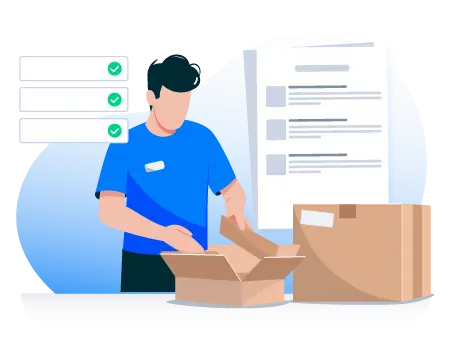Customs clearance fees for shipping in Europe & internationally in 2026
International parcel shipments are required to go through customs clearance, which may require paying fees and charges. While most shipments within Europe are exempt from customs clearance fees, there are exceptions. In this guide, we have gathered useful information on taxes, customs procedures, required documentation, and calculating declared values.

EUROPEAN UNION
Shipping within Europe: Customs clearance fees and charges
The European Union operates as a customs-free zone, meaning that goods produced within member states of the EU, and countries with specific contracts for free circulation of goods, are exempt from customs clearance charges. When shipping within the European Union, it is typically not necessary to pay any additional customs clearance fees, but there are a few exceptions.
Paying European Union customs clearance fees: The exceptions
Goods that fall under a state monopoly, like alcoholic beverages and tobacco products, are subject to specific regulations and require payment of excise duty. These types of goods are governed by different rules and may have additional requirements in order to comply with the legal framework.
Depending on the local legislation, some goods may be forbidden to leave or enter a specific country.
Exemptions from paying customs clearance charges in the EU
When shipping from non-EU countries to the EU, additional customs charges may apply. However, there are instances where you may be exempt from paying duties during the customs clearance procedures for your international parcel shipment.
- Some commercial goods may be exempt from customs duty.
- There is also a possibility of exemption from customs duty on international parcels if you deal with items subject to the so-called zero duty rate.
NON-EUROPEAN UNION
How much tax and customs duties do I have to pay when shipping packages internationally?
When shipping international parcels outside of the EU, you may be required to pay customs clearance fees and VAT for specific goods. Each country has its own unique regulations, so we strongly recommend consulting the importing and exporting countries for detailed information.
- VAT is calculated based on the total cost of specific goods and country regulations.
- Customs duties are calculated based on the value of the goods, customs tariff, and the origin of the goods.

Customs clearance charges for shipping internationally to the UK
Shipping between Europe and the UK has become more complicated since Brexit came into effect in January 2021. To help you prepare for your international shipment, we have compiled the following guides about shipping after Brexit:
Calculating the declared value for customs when shipping internationally
When shipping packages of goods internationally, the declared value plays a crucial role for customs officers in determining payable duties. The calculation of the declared value for customs varies depending on the regulations of the respective country. Generally, the following methods can be used to calculate the declared value for international shipments:
- The purchasing price of the goods: The price paid by the importer to the exporter for the goods being transported.
- Identical goods produced in the importing country: The price at which the same goods are currently being sold in the destination country.
- Similar goods, produced in the importing country: The price at which a similar product is currently being sold in the destination country.
- The selling price of the goods: The sale price of the goods in the country of exportation.
- The production cost of the goods: The cost of producing the goods, including materials and labour.
- Adaptation and mix of some of the methods mentioned above in exceptional situations: Depending on the specific circumstances and regulations of the destination country, a combination of these methods may be used to calculate the declared value for customs.
It is important to confirm the specific requirements of the shipping countries. The customs value of the product may involve specific costs or deductions, depending on the circumstances involved.

Declared value for carriage
The declared value for carriage is based on the value of the shipment and is used to calculate freight charges. Generally, the freight charges are lower than the declared value for customs, which is a separate value.
Customs clearance procedures for international parcels
Customs, or the customs duty office, is a national body of the local government responsible for overseeing customs clearance for international parcels, including applying the necessary fees. Each country has different regulation systems, so if you are shipping outside the EU, we have compiled a guide that includes all the necessary information you need to prepare beforehand!
Exporting outside the EU
SHIPPING GIFTS
Customs duties on gifts sent from abroad: shipment marked as a gift
European Union – For most countries within the European Union (EU), customs duties and value-added tax (VAT) are waived for gifts up to a certain value. However, it is advisable to check the specific regulations of each country before shipping to avoid any unexpected fees.
Non-European Union – When shipping items marked as gifts to countries outside of the EU, different sets of customs duties and fees may apply. The specific charges will depend on the regulations of each individual country. It is recommended to research the rules for customs clearance fees in advance to avoid any surprises.

REQUIRED DOCUMENTATION
Customs documentation for international shipping
When shipping globally, outside of the EU, you need to include shipping documentation that contains all the essential information about the contents being sent. At Eurosender, for global deliveries, you will be required to attach a proforma invoice or commercial invoice for the goods.
Customs authorities require that each item in the shipment be listed separately on the invoice, with its own description.
The shipment should also contain the receiver’s information, which will allow the customs officers to contact the designated person.
Check our guides below to learn about the most common documents needed for international shipping and instructions on how to complete them:
NEED MORE INFORMATION?
FAQ on customs clearance procedures on international parcels
What is meant by customs clearance for international parcels?
If you are sending a parcel across international borders, the shipment will go through customs. The customs authorities will ensure it follows the importing country’s regulations.
Am I required to pay customs clearance fees for my international shipment?
You or the sender will be responsible for paying the customs clearance charges for international parcels that are shipped outside of the European Union.
Who pays the customs fees for international parcel shipping?
Customs duties are usually paid by the receiver unless otherwise agreed with the sender.
Can the sender pay international shipping customs charges?
It is typically the receiver who is responsible for paying international shipping customs charges.
How much are the customs charges for my international shipment?
The customs fees for your international shipment will depend on the item you are shipping and the country’s regulations. You should check this in detail with the respected import country to see what else influences the customs cost calculation.
What happens if I refuse to pay customs fees or charges for international shipping?
If you refuse to pay the customs clearance fees, there are two possible scenarios:
- The package will be destroyed: If you choose not to pay the customs fees for your international shipment, the package may be discarded or destroyed.
- The parcel will be returned to the sender: In the event that you refuse to pay the customs fees for international shipping, the package may be sent back to the sender. Please note that in this case, the sender will be responsible for covering the additional shipping costs.
Do I have to pay customs clearance fees if I send gifts from Europe to the UK?
When shipping gifts from Europe to the UK, customs clearance fees will apply to gifts exceeding €45 (or £39).
Can I avoid paying customs clearance charges for my international shipment?
Unfortunately, you cannot avoid paying the customs clearance costs if you want to receive the shipment. These costs are determined by the local government requirements and are not within the control of the courier or Eurosender.
Will I pay customs if I send gifts from Europe to the UK?
You will have to pay customs for gifts exceeding €45 (or £39) when shipping from Europe to the UK. Not only that but, if you are shipping to and from the EU to any third country, your shipment will go through customs so that you may be charged additionally.
Why is my international package shipment stuck in customs?
There are many reasons why a package can be stopped in customs:
- The customs in the delivery country require more information.
- The paperwork is not done as required.
- The package contains any prohibited or restricted items.
- The mode of transport the package is being shipped with (air, road, rail, sea).
Read more about what to do if your package is stuck in customs.
How long will it take for customs to release my package?
The amount of time customs will hold your package depends on the specific circumstances. It can take anywhere from a few days to a couple of months.